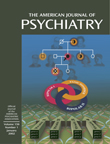Postpartum Panic Disorder in a New Father
To the Editor: For women, the postpartum period is a time of heightened risk for the onset or recurrence of panic disorder (1–3). However, we are aware of no published reports on the course of panic disorder in men during the postpartum period. Here is a report of a new father who had a recurrence of panic disorder after the birth of his first child.
Mr. A was a 33-year-old man who developed panic disorder with agoraphobia at age 19 and was treated with benzodiazepines by his general practitioner for several years. After enrolling in graduate school at age 27, he experienced a severe relapse into panic disorder with agoraphobia and was unable to attend his classes. He took a leave of absence while he sought psychiatric treatment. Mr. A began treatment with sertraline, 100 mg/day, and alprazolam, 0.5 mg b.i.d., and experienced a full remission of symptoms within 6 weeks. Over the course of 7 months, alprazolam was discontinued, and Mr. A remained well while taking sertraline, 100 mg/day. After 3 years of this drug regimen, Mr. A reduced his dose of sertraline to 50 mg/day and continued to stay well.
Two years later his wife gave birth to a healthy infant daughter. Although his wife was the primary caregiver for the baby, Mr. A experienced frequent nightly sleep interruptions. Within 2 weeks of the birth, Mr. A’s panic disorder had recurred. The panic attacks occurred daily, and agoraphobia prevented him from leaving the house unaccompanied. He took leave from work while he sought help. A resumption of treatment with alprazolam, titrated to 0.5 mg t.i.d., and an increase in his sertraline dose, to 100 mg/day, led to substantial improvement within 2 weeks. Mr. A was able to return to work at that time. By the fourth week of treatment, he had recovered fully. Over the subsequent 4 months, he stopped taking alprazolam. Mr. A continued to be well while receiving sertraline monotherapy over the subsequent 6 months.
This report highlights the need for greater attention to men’s mental health after the birth of a child. With a growing proportion of women in the workforce, men are likely to take on more child care responsibilities. Their emotional state has implications not only for themselves but also for the children in their care. Although the research literature on postpartum psychiatric disorders has grown substantially in recent years, it has focused almost entirely on women. Research on postpartum mood and anxiety disorders should be expanded to include new fathers, as should efforts to increase screening and education. This report also calls attention to the role of sleep disruptions in the course of panic disorder after childbirth. Patients with panic disorder, in contrast to patients with major depression, have been reported to experience a worsening of their condition after sleep deprivation (4).
1. Cohen LS, Sichel DA, Dimmock JA, Rosenbaum JF: Postpartum course in women with preexisting panic disorder. J Clin Psychiatry 1994; 55:289-292Medline, Google Scholar
2. Sholomskas DE, Wickamaratne PJ, Dogolo L, O’Brien DW, Leaf PJ, Woods SW: Postpartum onset of panic disorder: a coincidental event? J Clin Psychiatry 1993; 54:476-480Medline, Google Scholar
3. Metz A, Sichel DA, Goff DC: Postpartum panic disorder. J Clin Psychiatry 1988; 49:278-279Medline, Google Scholar
4. Roy-Byrne PP, Uhde TW, Post RM: Effects of one night’s sleep deprivation on mood and behavior in panic disorder: patients with panic disorder compared with depressed patients and normal controls. Arch Gen Psychiatry 1986; 43:895-899Crossref, Medline, Google Scholar



